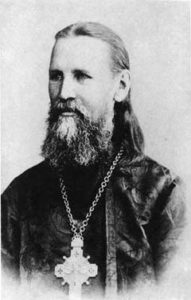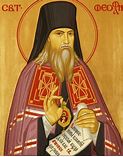SSCORRE!
Saint Sophia Cathedral
Online Resources for our Religious Edification

Topic of the Week – Here is a spectacle worthy of bitter lamentation: Christians who do not know in what Christianity consists! –St. Ignatius Brianchaninov
“…St. Ignatius Brianchaninov… addresses mentalities and ideas that have only become more accentuated in our times. As Orthodox Christians, St. Ignatius calls us to cultivate our understanding, not on arbitrary ideas from the world but rather the everlasting Truth of Jesus Christ. Great is the temptation to place a worldly narrative and reasoning above that of the Gospel. The ideologies that St. Ignatius exposes are still very much alive and active in our times, from ecumenism to covidism, and numerous other topics. St. Ignatius speaks squarely to us when he says, “If you are a Christian, you should have a Christian understanding of this subject, and not some other arbitrary opinion taken from nowhere.” As Christians, we must have a truly Christian understanding of the many subjects that surround us. But the Christian understanding is not popular in our times, and, as he addresses in his letter, many prefer to set fallen human reasoning above that of the Revelation of Jesus Christ.
May the Lord help us all! May we, by the grace of the Holy Spirit, reject the reasoning of the fallen mind and rather have our minds renewed in the Truth of Jesus Christ. The article speaks strongly for itself. I leave you to feed your soul on the words of St. Ignatius….”
Introduction by Fr. Zachariah Lynch, excerpted from Salvation in No Other Name: Christians! You Must Know Christ!
Adults/Family:
“Here is a spectacle worthy of bitter lamentation: Christians who do not know in what Christianity consists! Yet one encounters this spectacle almost everywhere one looks today; rarely, in the great multitude of those who call themselves Christians, can one find anyone who is a Christian both in name and in deed.
I will answer the question you have raised point by point, in as few words as possible. “Why,” you write, “cannot pagans, Moslems, and so-called heretics be saved? There are excellent people among them. To condemn these good people would be contrary to the Divine mercy! …Indeed, it is even contrary to sound human reason. –Heretics, after all, are Christians just the same. To consider oneself saved and the members of other faiths damned, is both foolish and extremely proud!”
Christians! You reason about salvation, yet you do not know what salvation is, why men are in need of it, and finally, you do not know Christ, the only means of our salvation. Here is the true teaching on this subject, the teaching of the Holy Ecumenical Church….
The Church has always acknowledged but one means to salvation: the Redeemer. She acknowledges that the greatest virtues of fallen nature lead to hell. If the righteous men of the true Church, the lamps from which the Holy Spirit has shown, prophets and wonder-workers who believed in the coming Redeemer but died before His coming, –if they descended to hell, how can you think that pagans and Moslems who have neither acknowledged nor believed in the Redeemer, but just because they seem good to you, have attained the salvation that is attainable by one means and one means alone, faith in the Redeemer?…
You say, “heretics are Christians just the same.” Where did you take that from? Perhaps someone or other, calling himself a Christian while knowing nothing of Christ, may in his extreme ignorance decide to acknowledge himself as the same kind of Christian as heretics, and fail to distinguish the holy Christian faith from those offspring of the cursed, blasphemous heresies. Quite otherwise, however, do true Christians reason about this. A whole multitude of saints has received a martyr’s crown, has preferred the most cruel and prolonged tortures, prison, exile, rather than agree to take part with heretics in their blasphemous teaching….
In ignorance of true Christian teaching, just like that you can take a false, blasphemous idea for a true one, appropriate it to yourself, and together with it appropriate eternal damnation as well….
Occupy yourself with the reading of the New Testament and the Holy Fathers of the Orthodox Church (but by no means Theresa, nor Francis… whom their heretical Church passes off for saints!); study in the Holy Fathers of the Orthodox Church how to understand Scripture aright, study there what kind of living, what kind of thoughts and feelings are fitting for a Christian. From Scripture and living faith study Christ and Christianity. Before the terrible hour comes in which you will have to appear before God in judgment, acquire the justification given by God freely to all men through Christianity.”
Read the entire post here Salvation in No Other Name: Christians! You Must Know Christ! – The Inkless Pen
Elementary School:
“[Orthodox] Christianity did not come to travel with other religions or coexist peacefully with them, and learn to get along. It came to dissolve false beliefs once and for all.” – Elder Athanasios Mitilinaios
If the elder says that Orthodoxy did not come to exist with other religions but to make false beliefs disappear, what is he saying about the other religions’ beliefs and what is he saying about the Orthodox beliefs?
Do you know what we as Orthodox Christians believe? If you don’t, how will you know which ideas are true and which are false? Here are some books to help you learn: A Visual Catechism of the Orthodox Church, The Law of God for Children.
Middle School:
“Christians! You must know Christ! You must realize that you do not know Him, that you deny Him if you acknowledge salvation is possible without Him for any kind of good works. He who acknowledges salvation to be possible without Christ denies Christ and, perhaps without knowing it, falls into the grave sin of blasphemy.” St. Ignatius Brianchaninov
Listen to Fr. Spyridon’s talk on THE DANGEROUS SELF-DELUSION OF BEING A GOOD PERSON
Why does Fr. Spyridon say being a good person is delusion? What is delusion? What is blasphemy? How is a person committing this sin of blasphemy if they think salvation is possible without knowing Christ?
High School:
Listen to Fr. Spyridon THERE IS ONLY ONE CHURCH ~ WHY ORTHODOXY?
“Where does the authority to decide what is truth lie? Where is it found? Because I am not capable of deciding in myself what the truth is. I am a sinful finite limited creature…. where is the authority to judge which of these competing claims [the one true Church] to be these very different versions of the truth, versions of the gospel, where does this authority sit?…
The nature of God and the relationship with God has been altered by Western theology…
It is not a loving act to encounter someone who is not part of the [Orthodox] Church and to pretend and to reassure them and to be friendly and just say ‘you don’t need to worry about it [the differences], you don’t need to repent, you don’t need to change what you are or the way you are. This is the nature of ecumenism. Orthodoxy does not believe that the Church exists anywhere except where the Church is. The Orthodox Church. The Church is one. It is visible. God gives his Church to the world and all are called to become members. What kind of loving act is it then to find someone who is outside of the Church and to pretend, to reassure them that they don’t need to become part of the Church to enter the kingdom of God? This is to leave people stranded. And this is ecumenism. Salvation is found in the Church. If we reassure people that they don’t need to become part of the Church, then we are in fact denying them salvation. We will have to answer for this to God on Judgment Day.
Christ taught that unless we drink his blood and eat his body we cannot have life in us. The Holy Communion He talks about is only to be found in the [Orthodox] Church. ..”
Why is there only one church – and that is Orthodoxy? How can we be Christians who DO know in what Christianity consists? What does St. Ignatius Brianchaninov say about that? As Orthodox Christians, what kinds of things does he say should we be reading? What kinds of things should we NOT be reading? (see explanation/link to article above in Adult/Family section.)
A Message from Maria Spanos
I am passionate about our Orthodox Christian faith and seek to help others learn as much as they can about it. My purpose here is to share online resources that help strengthen our relationship with Christ and bind us closer to His Church. I believe they are invaluable in learning about our precious Orthodox Tradition, and are a great aid for teaching family members, friends and others about Orthodoxy. ~Maria
Two of my favorite quotes:
 “A true Christian behaves in this life so that it may be a preparation for the future one and not only a life here below. In his actions, he does not think what will be said of him here but of what will be said there in heaven; he represents to himself that he is always in the presence of God, of the angels and all the saints, and remembers that someday they will bear witness of his thoughts, words, and deeds.” — Saint John of Kronstadt
“A true Christian behaves in this life so that it may be a preparation for the future one and not only a life here below. In his actions, he does not think what will be said of him here but of what will be said there in heaven; he represents to himself that he is always in the presence of God, of the angels and all the saints, and remembers that someday they will bear witness of his thoughts, words, and deeds.” — Saint John of Kronstadt
__________________________________________________________

“Of all the holy works, the education of children is the most holy.”
— St. Theophan the Recluse






